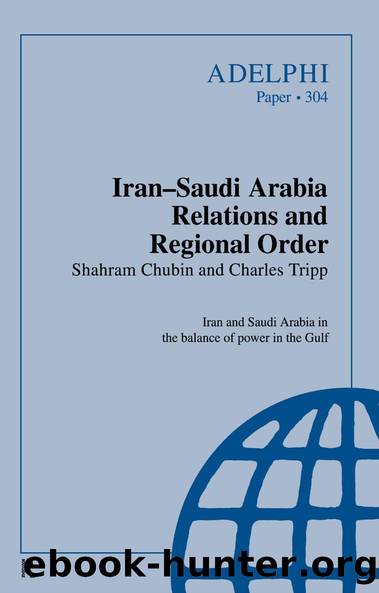Iran-Saudi Arabia Relations and Regional Order by Shahram Chubin Charles Tripp

Author:Shahram Chubin, Charles Tripp [Shahram Chubin, Charles Tripp]
Language: eng
Format: epub
Tags: History, Military, Strategy, Political Science, General, International Relations, Diplomacy
ISBN: 9781136043925
Google: NxKgBAAAQBAJ
Publisher: Routledge
Published: 2014-09-25T16:07:51+00:00
Barriers to Rapprochement â A Conclusion
A number of basic âstructural factorsâ have tended to complicate Iranâs relations with the Arab Gulf states and specifically with Saudi Arabia. Geopolitical elements, such as disparities in power, in population size, strategic depth, coastline and other asymmetries, in part capture the idea; so, too, does reference to the Gulf â whose very nomenclature is disputed â as illustrative of an ArabâPersian divide, cultural and historical as well as geopolitical. There is also a sectarian component in that Iran is the only Shiâi state and most of the worldâs Shiâa live in an arc around the shores of the Persian Gulf. This has increased the Arab rulersâ sense of vulnerability and has made harmonious relations with Tehran difficult.
These basic factors have been exacerbated by the conduct of the Islamic republic. In seeking a leadership role, initially by exporting the revolution, and later by diplomatic means and through appeals to Islamic solidarity, Tehran has ensured that relations remain infused with suspicion. The Arab states fear that significant parts of their populations may be manipulated by an unfriendly power. The very susceptibility of these sectors to such appeals, reflecting their poor integration and lack of representative institutions, increases the fury and suspicion of the Arab authorities, yet allows political agitation to be attributed to foreign designs rather than to indigenous discontent.
Regionally, the Saudi government has invoked foreign threats to ensure its leadership of, and promote cohesion within, the GCC.92 Saudi Arabia can play upon the GCC statesâ anxieties and attribute all the areaâs problems to Iran (and Iraq). This is easy enough, as noted in the domestic disturbances in Bahrain. In cases where Iran has a bilateral dispute with a neighbour, as with the UAE, Saudi Arabia can make the issue a test-case of Iranâs intentions, freezing relations until it is suitably resolved. Although not all of the Gulf rulers are willing to subscribe to the Saudi view to the same degree and may seek to establish their independence by cultivating closer relations with Iran, there are limits in this regard.
This state of affairs favours Saudi Arabiaâs extension of its authority in the peninsula and handicaps Iran, which is obliged to prove its good intentions repeatedly. Riyadh has sought to depict Iran as an irresponsible menace; in this it has had much help from Tehran. The concessions Iran would have to make and the measures it would have to take in order to overcome Arab suspicions would be virtually inconceivable given Iranâs domestic situation. The social composition of the area, the waning authority of some of the ruling families and Iranâs manifest power all have the capacity to produce an atmosphere of suspicion. In December 1995, Iranâs frustration with this state of affairs was given authoritative voice:
Saudi Arabia has always had a desire for domination in the region and the [West] has encouraged it to have this state of domination over the other five countries ⦠Who pursues this [island] issue? Saudi Arabia? Why? It wants to cover up its own hegemony.
Download
This site does not store any files on its server. We only index and link to content provided by other sites. Please contact the content providers to delete copyright contents if any and email us, we'll remove relevant links or contents immediately.
The European Opportunity by Felipe Fernández-Armesto(572)
The European History Highway: A Guide to Internet Resources by Dennis A. Trinkle Scott A. Merriman(537)
Morgan Kaufmann Digital Watermarking and Steganography by Ingemar Cox Matthew Miller Jeffrey Bloom Jessica Fridrich Ton(529)
The Seven Wonders of the Ancient World by Michael Denis Higgins(523)
Hyperculture by Byung-Chul Han(512)
European Security without the Soviet Union by Stuart Croft Phil Williams(511)
European Security in a Global Context by Thierry Tardy(507)
The Routledge companion to Christian ethics by D. Stephen Long Rebekah L. Miles(502)
Get Real with Storytime by Julie Dietzel-Glair & Marianne Crandall Follis(445)
Hudud Al-'Alam 'The Regions of the World' - a Persian Geography 372 A.H. (982 AD) by V. V. Minorsky & C. E. Bosworth(440)
Tibetan Studies in Comparative Perspective by Chih-yu Shih Yu-Wen Chen(437)
Gorbachev And His Generals by William C. Green(430)
Governance, Growth and Global Leadership by Espen Moe(428)
CliffsNotes on Fitzgerald's The Great Gatsby by Kate Maurer(414)
How Languages Are Learned 5th Edition by Patsy M Lightbown;Nina Spada; & Nina Spada(410)
The Egyptian Economy, 1952-2000 by Khalid Ikram(389)
The Oxford History of the World by Fernández-Armesto Felipe;(388)
Oral Poetry and Narratives from Central Arabia: The Poetry of Ad-Dindan : A Bedouin Bard in Southern Najd (Studies in Arabic Literature, Vol 17) (English and Arabic Edition) by P. M. Kupershoek P. Marcel Kurpershoek(368)
The Oxford Handbook of the Incas by Sonia Alconini(367)
